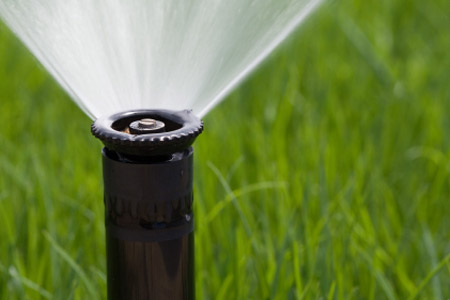MOWING TIPS
Proper mowing will lead towards a dense lawn which can tolerate stress and fewer weeds.
• To achieve a quality lawn, do not cut too short to ensure proper blade length for the process of photosynthesis. Short grass cannot tolerate stress during dry periods. Most grasses should be mowed at 2 inches to 2.5 inches in the spring and fall, 3 inches to 3.5 inches in the summer. This will allow grass plants to retain moisture. Tall fescue should be cut 2.5 inches to 3 inches year round.
• Mow as often as needed, so you don’t remove more than 1/3 of the grass blade at one time. You can damage grass plants by mowing more than 1/3 at a time.
• Mow shady areas higher and less frequently. Longer grass has more surface for photosynthesis which compensates for little sunlight.
• Maintain a sharp mower blade, because grass can be damaged by dull blades. Grass damaged by a dull blade is prone to diseases and may develop brown tips. Sharp blades are especially important for tough grasses such as zoysia, tall fescue and rye.
• Change mowing patterns to avoid water and compaction. Grass tends to lean in the direction as you cut. You do not want to always roll over the same areas, as this will compact the soil.

At Right Lawn Care, our specialists will give you proper mowing instructions that apply specifically to your lawn.
WATERING TIPS
Every soil type has their own capacity to hold water. Elements and conditions for every lawn are different and watering methods may vary.
Clay Soil is compact which can lead to puddling and runoff.
• Aeration on Clay Soil will allow oxygen, water and nutrients to penetrate the root system.
• Apply sand on surface of clay soil, and then perforate with a garden fork. As you water, the sand will fall into holes. Do this a few times and you will improve the drainage of clay soil.
• Water Clay Soil several times per week in dry weather conditions to help develop a deep root system.
• Sandy Soils are prone to good drainage in contrast to Clay Soil. Sandy Soils will require frequent watering every other day for 1 to 1.5 hours per area each time in hot weather conditions.
• Light watering everyday will develop shallow root system which can cause soil compaction and lawn dries out quickly.

At Right Lawn Care, our lawn specialists will conduct soil tests to determine how much water is needed and how often you should water. |








